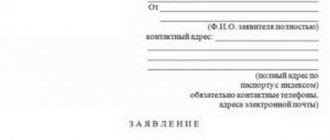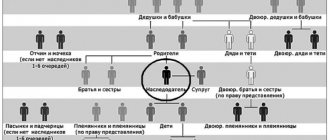If you believe that during the consideration of a civil case in the court of first instance (district or city) your rights were violated, you can appeal the decision made not in your favor by filing a complaint with the court. According to current legislation, an appeal is filed in court.
made a decision in the case. It should be noted that all persons who took part in the civil case, as well as persons whose rights and legitimate interests were violated by the decision, have the right to file.
What to do if an appeal has been filed against a court decision
After the expiration of the above-mentioned one-month period for appeal, the court that received the complaint sends it, along with all the materials of the case, to the appellate court, which then notifies the persons participating in the case of the time and place of consideration of the complaint in the appeal procedure. Persons notified in this way have the right to appear or not to appear at the court hearing (it is better to notify the appellate court in advance of failure to appear), to submit or not to submit written objections to the appeal.
Appeal
- persons taking part in the case: defendant, plaintiff, their authorized representatives, etc.;
- third parties whose rights and legitimate interests were significantly affected by the decision of the court of first instance or appellate instance.
What decisions can be appealed in cassation?
- there is no protocol of the court hearing in the case;
- the case was considered by the court in an inappropriate composition;
- legal norms regarding the secrecy of court conferences were violated;
- the trial took place in the absence of one of the obligatory participants in the case without proper notification of the person about the date and place of the court hearing, etc.
The final part of the complaint indicates the documents attached to it, which include, for example, a receipt for payment of the state fee. We advise you not to attach documents to the appeal that were not submitted to the court of first instance. It is better to ask the court to take into account the new circumstances of the case by filing an appropriate petition already during the appeal process.
Appeal procedure
When filing an appeal, you cannot indicate claims that have not previously been filed in the court of first instance. If new evidence is attached to the complaint, the text of the complaint must indicate why this evidence could not be presented to the court of first instance. If the appeal, when filed, does not meet the content of the requirements, the court leaves it without movement. The court ruling indicates the shortcomings of the complaint and sets a deadline for correcting them. If you disagree with the arguments of the ruling, you can appeal it by filing a private complaint with the appellate authority.
We'll complain again
Please note that the deadline for filing an appeal is one month from the date of the final court decision. Previously, a court decision could be appealed only within 10 days. Individual complaints will now also be considered by appeal , that is, complaints not against the decision as a whole, but against the ruling of the court of first instance on any of the issues that arose during the consideration of the case. At the same time, the period for filing a private complaint has been increased from 10 to 15 days, and its consideration will now take place without notifying the parties (new edition of Article 333 of the Code).
Appeal - what is it? Appeal to court: features, requirements and recommendations
An appeal to the court is filed when there is evidence that the interests of the accused party have been violated. As a result of such a step, one can hope that the court will reconsider its decision and soften the sentence imposed. You can file an appeal in many cases, they can be related to criminal, civil and commercial rights. Who can file appeals with the Court of Appeal? There are no big restrictions here, in fact there are a huge number of entities that can file a complaint in court, but in most cases, it all depends on the process itself.
This is important to know: Appealing a determination to return an appeal
Where to send an objection and when should it be done?
There is no strict limit on where you can file your appeal. It can be accepted either in the district court or in the appellate court. In addition, the review can be brought directly to the court hearing regarding the consideration of the complaint, but in this case, you must remember that it will be taken into account only if you provide it for review before the verdict is announced.
While the legislation clearly defines the deadlines within which a person filing an appeal must meet, no such framework is established regarding when to file an objection. There is a wording - a reasonable period. It is established by the court based on many nuances relating to the case under consideration, such as:
- Type of process (the deadlines for filing objections in criminal, civil and arbitration cases differ);
- The deadline for delivery to the winning party of notification that an appeal has been filed against the decision in their favor;
- The volume of material presented in the appeal;
- The complexity of the initial case.
If necessary, you can always write a statement and increase the deadline for filing an objection by court decision.
Appeal: what is it? Properly filing an appeal
An appeal against a court decision is filed in the court where it was made. Of course, you can submit it directly to the appellate authority, but it will most likely not be accepted. However, it is worth noting that the Supreme Court of the Russian Federation indicated that if the applicant sent a complaint directly to the appellate authority, this should not be a basis for returning the case to the applicant. In this case, the courts must agree, with additional measures, on the procedure for transferring the complaint to the first instance, after which it is returned to the second. However, this time along with the case materials.
Errors in appeal
Lawyers typically make three basic mistakes in appellate court.
They do not check the unconditional grounds for canceling a decision
This is a strong argument for overturning the decision, but it is often overlooked. Lawyers are too keen on justifying their position and describing the circumstances, but forget to check whether there are unconditional procedural violations in the case.
If the appellant finds at least one such violation, the court will cancel the decision and reconsider the case according to the rules of the first instance, that is, it will reconsider the dispute on the merits. During such a review, it will be possible to submit petitions and statements, present evidence, if for some reason they did not do this in the first instance.
Most often in complaints, appellants refer to two violations - the court considered the case without a person participating in the case, who was not notified of the time and place of the hearing, or the court made a decision on the rights and obligations of persons who were not involved in the case.
If the judge in the case was illegally replaced or territorial jurisdiction was violated, you can refer to the consideration of the case in an illegal composition of the court.
Expert opinion
Grigoriev Egor Kirillovich
Legal consultant with 7 years of experience. Specializes in criminal law. More than 3 years of experience in protecting legal interests.
Check if there is a court record in the case - higher courts often overturn decisions due to its absence. If there is no audio recording of the court hearing in the case, the courts can also overturn the decision on the same grounds.
The appeal will overturn the decision if there is no audio recording, but it contained information that served as the basis for the adoption of a judicial act. Therefore, indicate in your complaint what important information was on the audio recording. For example, interrogation of witnesses, experts, examination of evidence.
Lawyers are bad at building a defense
The lawyer cites in the appeal an endless list of court errors from serious to insignificant.
For example, when he points out that the judge incorrectly applied the rules and was not wearing a robe, the second argument clearly negates the seriousness of the first. The appellants usually formulate the violations themselves in general terms - without reference to specific evidence and case materials. Judges rarely take such complaints positively.
Recommendation - write no more than four to five clearly stated reasons for cancellation. In each argument, it is advisable to describe three points: the lower court's error, the incorrect conclusion it reached because of that error, and the conclusion the court should have reached.
Lawyers are passive during appeals
When the court has already considered the case on its merits, lawyers think that their task in the appeal is only to present arguments for and against the court’s decision. This is not entirely true. An appeal is the last opportunity to close evidentiary gaps in the positions of the parties in the case. Take advantage of this.
Try to present evidence essential to the case in the appeal, file motions. The appellate authority may accept additional evidence from a party and consider requests for new evidence, but only in two cases. The first case is if the party justifies that it could not present them to the first instance for valid reasons. The second is if the court of first instance rejected them. That is, in the appeal it is necessary to once again state all the petitions and evidence that were rejected by the first instance.
This is important to know: Leaving an appeal without consideration under the Code of Civil Procedure of the Russian Federation
If you did not present evidence at the first instance, but it is essential to the case, still present it on appeal. If you cannot give good reasons or they are clearly “extracted,” the likelihood that the court will accept the evidence or satisfy the petition still remains: the court would rather accept new evidence than not accept it at the risk of canceling the judicial act.
For example, a company filed a claim against the company for unjust enrichment. Since the defendant did not provide evidence that he withheld the transferred money justifiably, the court granted the claim. To the appellate court, the defendant presented contracts and service acceptance certificates, which confirmed the existence of obligations between the plaintiff and the defendant and the basis for payments. The appeal added documents to the case and dismissed the claim. The higher courts agreed with the appellate court.
Appeal: abuse of right and grounds for return
It must be admitted with regret that the introduction of the institution of leaving an appeal without progress has not only positive consequences (such as guaranteeing the rights to judicial protection and increasing the speed of justice), but also negative ones - in cases where the malicious use of this institution allows delaying the judicial process. process. Abuse of rights by participants in the process related to the imperfection of the legislation on leaving a complaint without progress 1. The court has the right to leave the AJ without motion based on the applicant’s failure to fulfill the obligation to send a copy of the AJ to other participants in the process. In order to circumvent this requirement, unscrupulous persons who are not interested in the normal flow of the process and the prompt resolution of the case by the court send empty envelopes or blank sheets without text to the other party to the process, and present to the court original receipts with a post office mark, on the basis of which the complaint is accepted to production. This has become somewhat widespread for the reason that the current Arbitration Procedure Code of the Russian Federation does not provide for liability for failure to notify other persons involved in the case about the filed AJ. It is possible to eliminate such situations only by changing the current legislation. It is necessary to require not only the presentation of original receipts for sending postal correspondence, but also the presentation of internal descriptions of the contents of registered letters with a post office mark in the form of a stamp with the date of departure. It is unlikely that such a provision will be introduced into arbitration procedural legislation in the near future, however, it should be recognized that only in this form can the applicant properly confirm the fact of sending court documents to the other party to the process. 2. After a court decision has been made to satisfy the stated claims, the defendant, seeking to delay the moment of execution of the decision, submits an AJ, which obviously contains defects. As a result, the plaintiff (or applicant), in whose favor the case was resolved, does not have the opportunity to enforce the decision for a long time. 3. The submitter of the AJ (after the appellate court left his complaint without progress) can file a cassation appeal against the decision to leave without movement, which will delay the process for some more time. Thus, the rules governing the filing of complaints against judicial acts of arbitration courts need to be improved in order to eliminate the possibility of abuse by persons interested in delaying the process. It would be advisable to establish a rule in the Arbitration Procedure Code of the Russian Federation, according to which the arbitration court would accept for production an insurance policy that meets the general requirements established by Art. 260 of the Arbitration Procedure Code of the Russian Federation (including some defects), but if its defects were discovered, it could require the appellant to eliminate them. Such an approach would certainly contribute to the speedy consideration of cases. Controversial issues of the grounds for returning the appeal It is necessary to pay some attention to the return of the appeal - a natural consequence of the failure to take measures to eliminate its shortcomings during the period without movement. The greatest interest is in the return of life insurance in case of rejection of the application for a deferment, installment payment of the state fee or a reduction in its amount. To date, there has been no uniform judicial practice regarding this issue. There are often situations when the arbitration court of appeal, in accordance with Art. 264 of the Arbitration Procedure Code of the Russian Federation returns the AJ to the applicant, and the cassation court cancels this ruling of the appellate court as adopted due to the incorrect application of the norms of procedural law and transfers the case for consideration to the second instance. For example, the Resolution of the Federal Antimonopoly Service of the Moscow District dated January 20, 2005 N KG-A40/11792-04 states that, when refusing to satisfy a request for deferment of payment of the state fee due to failure to submit the necessary documents, the appellate instance, correctly referring to the explanations of the plenum of the Supreme Arbitration Court of the Russian Federation dated 03/20/1997 N 6 “On some issues of application by arbitration courts of the legislation of the Russian Federation on state duties”, did not apply the institution of leaving the AJ without movement. From another Resolution of the Federal Arbitration Court of the Moscow District it follows that the refusal to satisfy a request for deferment of payment of the state duty serves as the basis for leaving without movement, and not returning the AJ (see Resolution of the Federal Arbitration Court of the Moscow District dated January 31, 2005 N KG-A40/13217-04 ). Meanwhile, as mentioned above, the current Arbitration Procedure Code of the Russian Federation does not provide for such a basis for leaving without movement (despite the fact that Article 264 of the Arbitration Procedure Code of the Russian Federation clearly regulates the grounds for returning the property to the applicant). Summarizing the above, I would like to emphasize the need to finalize the provisions of Art. 263 and 264 of the Arbitration Procedure Code of the Russian Federation, which will allow, on the one hand, to facilitate the implementation by interested parties of their right to judicial protection, and on the other hand, to help eliminate abuse by unscrupulous persons. So, in case of non-compliance with the requirements for the content and form of the appeal, it is not returned to the applicant, as was provided for by the Arbitration Procedure Code of the Russian Federation of 1995, but is left by the ruling without movement. This rule was introduced to prevent cases of unfounded return of complaints, eliminate cases of refusal to protect violated and disputed rights and increase the speed of justice. This institution should be regarded as an additional guarantee of ensuring the applicant of the appeal the right to judicial protection of his violated rights, taking into account the fact that the possibility of refusal of such protection on formal grounds is excluded. Evgeniy Matveev Source: First Perm legal portal
Errors in cassation
Lawyers make six common mistakes. The first three were discussed in the section on appeal. Three more errors are typical only for cassation.
In 99 percent of cases when cassation upholds decisions of lower courts, it indicates that the arguments of the complaint are aimed at reassessing the factual circumstances of the case and evidence. And this is not within the scope of consideration of the case in cassation. Cassation only checks whether the courts correctly applied the rules of substantive and procedural law.
The reason for this practice is that lawyers often copy the text of the appeal into the cassation complaint. For example, the complaint writes that “the conclusions of the courts do not correspond to the factual circumstances and the evidence presented in the case.”
In your cassation appeal, refer specifically to errors in the application of the rules - these are your main arguments. All arguments that are related to non-research or incorrect assessment of evidence are given only to confirm the court’s errors.
The arguments of the complaint do not correspond to the pleading purpose
The goal of the cassator is to achieve the reversal of judicial acts with which he does not agree. To do this, he can ask the cassation court, for example, to adopt a new judicial act in the case, to send the case for a new trial, or to leave in force one of the decisions or resolutions previously adopted in the case. Sometimes cassation officers ask to adopt a new act in the case - this is the most advantageous for the party, regardless of the circumstances of the case and the arguments that it brings.
The cassation court will not be able to adopt a new act, since to do this it will have to examine and evaluate the evidence, and the cassation court does not have the right to do this. Such a discrepancy between the request and the arguments reduces the credibility of the complaint and often raises questions and criticism in the court of cassation.
Study the case materials and select possible arguments for cassation. After this, decide how to formulate the pleading part of the cassation appeal.
Additional documents submitted too late
Lawyers often file position papers too late and draft them incorrectly. Courts usually accept documents directly at the hearing, but not cassation documents. If you submit a response to the complaint, additions, or written explanations directly to the hearing, the cassation office may reject them. For example, the court indicated that written explanations were received on the eve of the court hearing and refused to include them in the case materials.
Consider the peculiarities of the court. For example, the Arbitration Court of the Moscow District may not accept written explanations, since it considers them new evidence that the cassation cannot accept. Therefore, format additional explanations as the text of a speech - the courts usually accept it.
Appeal, what next?
Any court ruling may be reviewed by way of supervisory review upon the proposal of the Chairman of the Supreme Court of the Russian Federation or his deputy. The subject of appeal is any court decision made at any stage of the proceedings.
Lawyer in Moscow all regions of the Russian Federation
If you believe that during the consideration of a civil case in the court of first instance (district or city) your rights were violated, you can appeal the decision made not in your favor by filing a complaint with the court. According to current legislation, an appeal is filed in court. made a decision in the case. It should be noted that all persons who took part in the civil case, as well as persons whose rights and legitimate interests were violated by the decision, have the right to file.
- the name of the court where you are addressing the complaint;
- your initials, procedural status, address;
- an indication of the court that made the decision and the decision itself;
- reasons why you consider the decision to be untenable and references to legal norms;
- list of attached documents;
- signature.
The trial court is not the end. After it come the cassation and supervisory, and if you applied to the arbitration, then before the cassation comes the appeal. In Moscow, cassation complaints are handled by the board of the Moscow City Court - there are such boards in all regions, districts, and territories. You need to send your complaint there.
What should be included in a preliminary appeal?
Any business consists of stages. The process involves not only the plaintiff and the defendant, but also a huge number of authorities, many people, and countless nuances. Each stage of the legal process cannot be predicted with 100% accuracy. Nobody canceled the human factor, unexpectedly revealed little things, new evidence.
Lawyers often file position papers too late and draft them incorrectly. Courts usually accept documents directly at the hearing, but not cassation documents. If you submit a response to the complaint, additions, or written explanations directly to the hearing, the cassation office may reject them. For example, the court indicated that written explanations were received on the eve of the court hearing and refused to include them in the case materials.
This is a strong argument for overturning the decision, but it is often overlooked. Lawyers are too keen on justifying their position and describing the circumstances, but forget to check whether there are unconditional procedural violations in the case.
Types of appeal
There are three types of complaints:
Each stage of the challenge involves appealing to a strictly defined court. It is interesting that a complaint against the initial decision, according to Article 321 of the Code of Civil Procedure of the Russian Federation, must be filed with the same judicial body that considered the case. Various comments on this provision do not clearly reveal the essence of this step.
To people who are encountering such a procedure for the first time, this process seems strange and illogical. However, appealing to the same authority to which the complaint is directed implies only formal compliance with strict procedures. All documents related to the case are forwarded to the appellate judicial body after the appropriate procedures for notifying all parties to the process have been completed.
You need to know that consideration of complaints cannot be carried out by the body that initially considered the claim.
Expert opinion
Grigoriev Egor Kirillovich
Legal consultant with 7 years of experience. Specializes in criminal law. More than 3 years of experience in protecting legal interests.
Appeal
The first and only stage in the appeal procedure is an appeal, while the applicant has the right not only to challenge the decision, but also the opportunity to count on a more competent review of the case.
This is important to know: Statement to eliminate deficiencies in an appeal: sample 2021
After the announcement, the 30-day period for appealing the court decision begins. It sometimes changes upward based on the request of the citizens participating in the process, or those whose interests were affected; in the case where a person could not submit an appeal on time for a good reason, respect is confirmed in documentary order. During the first month allotted for challenging, the resolution has no legal force.
A complaint about a decision that does not comply with legal standards is submitted to the office of the body that initially examined the case. The document is submitted in person or sent by mail, with the obligatory execution of registered mail and notification of receipt. The office is obliged to send copies to all persons who are interested in the outcome of the proceedings, and the original is sent to a higher judicial authority.
It should be noted that the review of the case in the appropriate appellate instance does not take place immediately. According to Article 325 of the Code of Civil Procedure of the Russian Federation, the materials and the submitted complaint are sent for reconsideration only after the end of the thirty-day period allowed for appeal.
Depending on the original hearing authority, appeals in civil cases are carried out by:
- district court (challenging the decision of the magistrate);
- court of a subject of the Russian Federation - city, regional, etc. (appealing the actions of garrison military and district courts);
- collegiums of the Supreme Court of the Russian Federation - appeal, judicial (complaints against decisions of regional and regional courts, supreme courts of republics, etc.);
- In the Moscow City Court, a separate instance deals with the review of copyright cases previously considered by the same court.
The structure of the appeal is regulated by Article 322 of the Code of Civil Procedure of the Russian Federation. The text must indicate:
- The name of the authority to which the applicant applies.
- Information about the applicant.
- Information about the decision being appealed and the grounds indicating its illegality.
- Previously stated requirements.
The last point suggests that the inclusion of new requirements is not acceptable. Additional evidence that was not available in the previous trial is sometimes accepted for consideration if there are compelling reasons that it could not have been presented earlier.
Any inaccuracies in the drafting of the text may lead to the document being returned to the applicant, or the judges will issue rulings specifying deadlines for eliminating the deficiencies.
A distinctive feature of the rulings adopted during the review of cases is their immediate entry into force from the day of their issuance. However, they can also be appealed.







